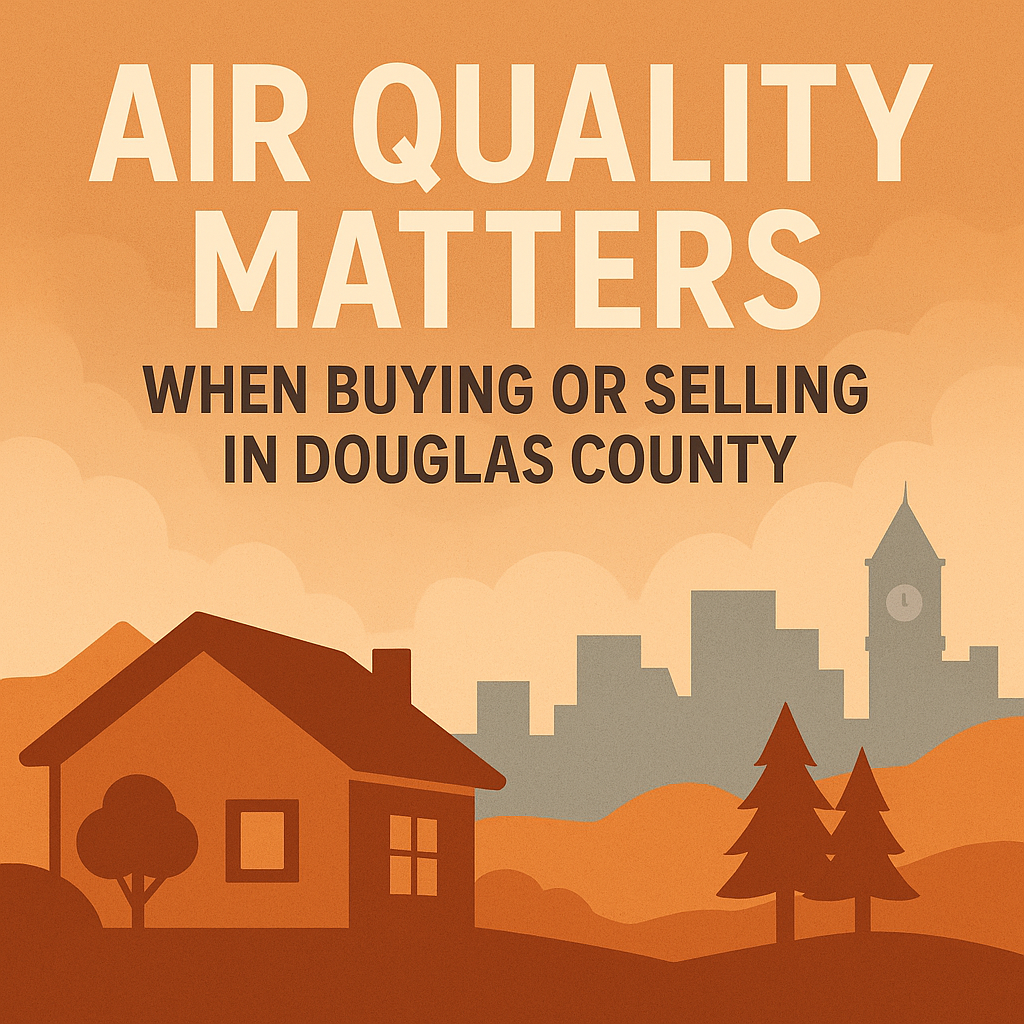Published October 24, 2025
Air Quality Monitoring in Douglas County

Air Quality Monitoring in Douglas County
TL;DR
• Douglas County faces air quality challenges, particularly due to wildfire smoke.
• Local neighborhoods like Parker and Castle Rock have specific air quality concerns.
• Monitoring air quality is essential for health, impacting home and land values.
• Accessibility and ADA compliance in homes can help mitigate health issues.
• Engaging with County Health for permits and building regulations ensures safety.
• Staging and home organization improve living environments.
What Are the Air Quality Challenges in Douglas County?
Living in Elizabeth, Colorado, we're no strangers to the environmental beauty and challenges that come with ranch-style living in Douglas County. Our picturesque views can be marred by air quality issues, primarily from wildfire smoke. As a realtor deeply invested in the health and well-being of my clients, I'm keenly aware of how air quality impacts both lifestyle and property values in neighborhoods like Parker, Franktown, and Castle Rock.
Wildfire smoke is a recurring concern that deteriorates air quality, posing significant health risks. These concerns aren't just hypothetical; they're real and present in our community. One of my clients in the Parker area experienced respiratory issues exacerbated by poor air quality, prompting them to invest in a home with advanced air filtration systems. This decision not only improved their health but also increased their property value, showcasing how air quality can directly impact home desirability.
How Does Air Quality Monitoring Work in Our Neighborhoods?
Air quality monitoring in Douglas County involves a combination of state-of-the-art technology and community engagement. The Colorado Department of Public Health and Environment (CDPHE) operates several monitoring stations throughout the county, providing real-time data on pollutants like particulate matter, ozone, and nitrogen dioxide. This data is crucial for residents in areas such as Stonegate and The Pinery, where outdoor activities are a significant part of daily life.
For homeowners, understanding air quality data can guide decisions on home improvements. Installing air purifiers or upgrading HVAC systems with HEPA filters are some ways to combat indoor air pollution. Moreover, ensuring proper ventilation during times of high outdoor pollution is vital, especially in homes with main floor living designs that are popular in our area.
How Does Poor Air Quality Affect Health and Home Values?
The health implications of poor air quality are considerable. Prolonged exposure to pollutants can aggravate conditions like asthma and other respiratory issues. In neighborhoods like Castle Rock, where families often spend time outdoors, these health risks are a significant concern.
From a real estate perspective, air quality directly influences property values. Homes in areas with poor air quality often see reduced demand, leading to lower prices. Conversely, properties equipped with systems to mitigate air quality issues tend to maintain or even increase in value. For instance, a client of mine in Franktown invested in a top-tier air purification system, which not only improved their family's health but also made their home more attractive to potential buyers.
What Are the Pros and Cons of Air Quality Monitoring?
Pros
• Health Improvement: Regular monitoring helps residents take timely action to protect their health.
• Informed Decisions: Access to accurate data allows homeowners to make informed decisions about home improvements.
• Property Value: Homes with systems to improve air quality are more attractive to buyers, potentially increasing property values.
Cons
• Cost: Implementing air quality improvements, such as advanced filtration systems, can be expensive.
• Maintenance: Regular upkeep of air quality systems is necessary to ensure effectiveness.
• Awareness: Not all residents are aware of air quality issues, which can lead to inaction.
How Can Homeowners Improve Air Quality in Their Homes?
Improving air quality at home starts with awareness and action. Here are some steps homeowners in Douglas County can take:
• Regular Maintenance: Ensure HVAC systems are regularly serviced and filters are replaced.
• Air Purifiers: Invest in air purifiers, particularly those with HEPA filters, to capture airborne particles.
• Ventilation: Use exhaust fans in kitchens and bathrooms to reduce indoor pollutants.
• Landscaping: Incorporate trees and plants that improve air quality around your home.
Incorporating these practices not only fosters a healthier living environment but also aligns with staging prep techniques that enhance home presentation for potential buyers. As I often advise clients in the Parker and Castle Rock areas, a well-maintained home with good air quality is always more appealing in the real estate market.
What Role Does County Health Play in Air Quality?
The County Health Department is integral in monitoring and managing air quality issues. They provide guidelines for septic permits and building regulations, ensuring that new constructions adhere to standards that protect air quality. For residents planning to build or renovate, engaging with County Health is a crucial step.
For example, a client in The Pinery needed to secure a septic permit for their new home. During the process, they discovered additional requirements for air quality management, which ultimately led to a more sustainable building approach. This experience underscores the importance of understanding county regulations and their impact on health and property values.
FAQs About Air Quality Monitoring in Douglas County
1. How often is air quality data updated in Douglas County?
Air quality data in Douglas County is updated in real-time, thanks to monitoring stations operated by the CDPHE. Residents can access this data online to stay informed about current conditions.
2. What are the main pollutants affecting our area?
The primary pollutants in Douglas County include particulate matter from wildfire smoke, vehicle emissions, and ozone. These pollutants can have significant health impacts, especially during peak exposure periods.
3. Can improving air quality systems increase my home's value?
Yes, homes with advanced air quality systems are often more attractive to buyers, potentially increasing property values. This is especially true in areas with known air quality issues.
4. Are there grants or incentives for improving home air quality?
There are occasional state and federal incentives for upgrading home air quality systems. Homeowners should check with local authorities for current programs.
5. How does air quality impact outdoor activities in Parker and Castle Rock?
Poor air quality can limit outdoor activities, particularly for sensitive groups. Residents are advised to monitor air quality data and adjust plans accordingly, ensuring safety during periods of high pollution.
In conclusion, air quality monitoring in Douglas County is a vital aspect of maintaining a healthy living environment. As residents and homeowners, being informed and proactive about air quality can enhance both our health and property values. Whether you're considering new construction or ways to improve your existing home, understanding the impact of air quality is essential. For personalized advice and real estate services, feel free to contact me, Marjorie Engle.
Marjorie Engle
Call or text 303-881-2707





